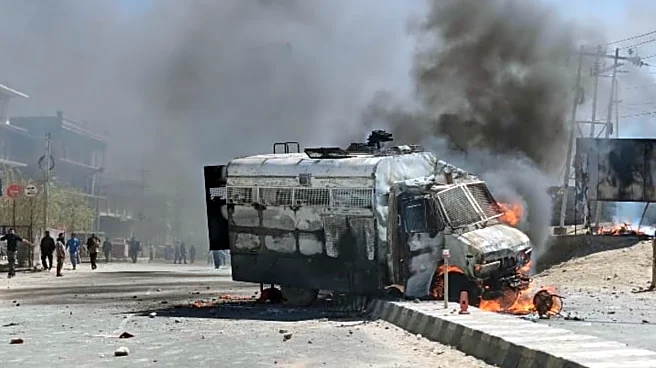In today’s world, violent protest cannot be a way to manage affairs. National security is paramount. Democracy works through representation, dialogue, and reasoned arguments, not by taking the system hostage.
The tragic turn of events in Ladakh underscores the dangers of ignoring these democratic principles.
The provocative statements by climate activist Sonam Wangchuk led to violence in Leh that left four people dead and scores injured. My heart goes out to families of the deceased who lost their loved ones in the senseless violence. The tragedy raises an urgent question: when democratic institutions are functioning and avenues of dialogue exist, why must protests resort to disruptive and destructive means?
The Government of India has been actively engaging with the Apex Body Leh and the Kargil Democratic Alliance through the High-Powered Committee (HPC), a sub-committee, and multiple informal channels. These efforts have already yielded phenomenal results, including raising Scheduled Tribe reservations in Ladakh from 45% to 84%, granting one-third women’s reservation in councils, declaring Bhoti and Purgi as official languages, and initiating the recruitment process for 1,800 posts.
However, a group of people led by climate activist Sonam Wangchuk were on a hunger strike since September 10, demanding dialogue with the Centre over Ladakh’s inclusion in the Sixth Schedule and the grant of statehood.
Since then, the protesters on a daily basis issued provocative statements. In the aftermath of this, several individuals started circulating voice messages on WhatsApp groups and other social media platforms, asking people to gather at NDS memorial park.
Despite appeals from several leaders to end the protest, Wangchuk continued his hunger strike and misled people with “provocative references to Arab Spring-style protests and Gen Z demonstrations in Nepal”.
It seems Wangchuk forgot the basic rule that leadership carries responsibility. When leaders mislead followers with romanticised references to foreign uprisings, they risk igniting fires they cannot control. In Leh, those fires claimed lives.
On September 25, 2025, the protesters moved outside the venue. They resorted to violence, pelted stones on security forces, burnt offices and vehicles which led to deaths and injuries.
At the heart of this episode lies a fundamental tension between democracy and street politics. India’s democratic framework provides space for representation, grievance redressal, and institutional dialogue. Ladakh has access to multiple democratic channels — parliamentary representatives, council structures, and committees dedicated to local issues.
In such a context, turning to disruptive street mobilisation is not only counterproductive but also dangerous. It risks destabilising social harmony, undermining trust in institutions, and giving space for violence to hijack legitimate demands.
The lesson is clear: protests cannot substitute democratic engagement. While peaceful protest has historically played a role in drawing attention to issues, when it drifts into provocation and violence, it ceases to be an instrument of democracy and becomes a threat to it.
Ladakh is not just any other region — it is a frontier territory of immense strategic significance. Nestled between two of India’s most sensitive borders, its stability is inseparable from national security. The government, therefore, cannot afford to allow disruptive and violent mobilisations to take root.
This is not to deny the right of people of Ladakh to demand safeguards for their land, culture, and identity. But when such demands are pursued in ways that risk law and order, they inadvertently play into the hands of those who wish to destabilise the country’s unity.
National security must always remain paramount, and no government can permit agitation — no matter how emotive — to compromise it.
The way forward for Ladakh lies not in confrontation but in deepening democratic engagement. The government must continue its outreach, building on the gains already achieved. At the same time, Ladakh’s leaders must act responsibly, avoiding rhetoric that undermines peace.
The tragedy in Leh is a sobering reminder that protests — peaceful or violent — are not sustainable ways to manage national affairs. In a democracy, the path forward lies in dialogue, representation, and reasoned debate, not in taking to the streets with provocative slogans and destructive intent.
Wangchuk’s campaign, once seen as an expression of ecological and cultural concern, lost its moral force when it veered into provocative rhetoric and incited violence. The government’s responsibility now is twofold: to ensure that law and order are upheld and to continue addressing Ladakh’s aspirations with sincerity and sensitivity.
At the same time, the people of Ladakh must recognise that national security, peace, and development are best safeguarded through constructive engagement with democratic institutions. The deaths in Leh should never have happened; they must now serve as a turning point — a reminder that violence destroys, but democracy builds.
Sheikh Khalid is a Kashmir-based columnist, author, and BJP leader. Views expressed in the above piece are personal and solely those of the author. They do not necessarily reflect News18’s views.





/images/ppid_a911dc6a-image-177084257810510483.webp)

/images/ppid_a911dc6a-image-177084253417916956.webp)

/images/ppid_59c68470-image-177084004043125742.webp)

/images/ppid_a911dc6a-image-177083903258342419.webp)


